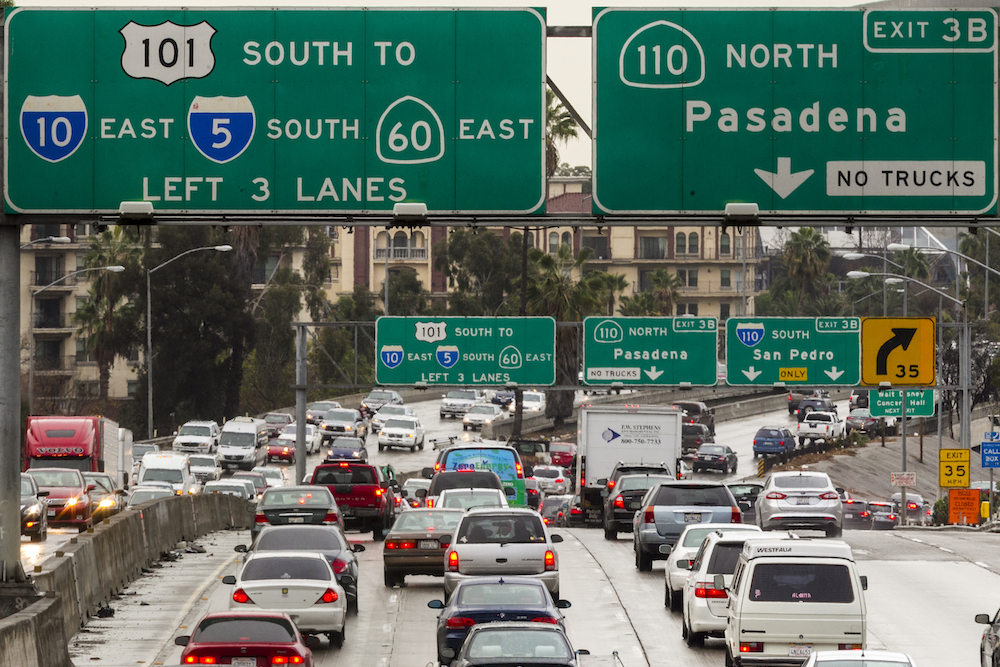
California traffic misses you. Courtesy of Damian Dovarganes/Associated Press.
Admit it. You miss me, don’t you?
No? OK, maybe you’re not ready to recognize how much you need me. I understand.
I know you’ve never liked me, and for that I’ve never blamed you. You Californians like to live your lives fast, and I’m all about slowing you down. So I try not to let it bother me that you complain about me more than drought or Donald Trump.
I understand that I make you late to school and to work. I lengthen brutal commutes that keep you behind the wheel for hours when you’d rather be working out, watching a game or playing with your kids. And I contribute to pollution that causes everything from asthma to climate change.
But give me this much: When COVID-19 came, and I took a vacation, California suddenly didn’t feel like California anymore.
At first, you celebrated my disappearance as a rare ray of light in a dark time. The roads were wide open. You could actually get from downtown San Diego to North County, or from Pasadena to Long Beach, or from San Francisco to Palo Alto, in 30 minutes. The Bay Area bridges were no longer jammed. Even when businesses started to reopen, traffic was less than 80 percent of normal around the state.
But as the pandemic drags on, I suspect many of you secretly wish I would come back. There is something disorienting, even apocalyptic, about all those empty roads. Your state just isn’t the same without me.
Truth be told, under normal circumstances, California isn’t the most congested place in the United States. Much of our giant state is empty, while Hawai‘i’s small island roads are packed with too many Californians who like to drive. My fearsome reputation is really based on the fact that California’s giant urban regions have some of the world’s worst traffic.
People also tend to dwell on my costs—in gas, vehicle maintenance, air quality, and lives—without appreciating the many benefits I provide. Now that those benefits have vanished, I wonder if you might give me a little more respect.
For starters, I’m the best excuse you have for your flakiness and irresponsibility. When you’re ludicrously late to school or work, or when you miss your brother’s wedding, all you need is to invoke me, traffic, and your fellow Californians will absolve you of your sins. Now, in the pandemic, you probably don’t have to be anywhere, but if you do, and you’re late, you’ve got no excuse. You’re just rude!
So, in the spirit of forgiveness, I hope that COVID has given you a more permissive perspective on time. Transportation agencies across California like to issue studies that accuse me, traffic, of being a thief, by robbing from you 60 or 80 or 100 hours of time each year that you could instead have spent with your families. But now that so many of you are stuck with your families all the time, I detect a new appreciation for all the quality time you used to spend stuck with me. I let you listen to whatever awful music you like without ever complaining. Can you say the same of your kids?
Those points may seem trivial, but the carnage on our roads—more than 3,500 traffic deaths annually—is serious. And the pandemic suggests that my talent for congestion actually keeps you safer. In the early weeks of the lockdown, traffic accidents, injuries, and deaths dropped precipitously. But since then, without me around to slow people down, drivers have been speeding, and the roads have gotten much deadlier. In fact, even with much less traffic, we’re on track to have just as many deaths on the roads this year as we did in 2019, which is why Californians are seeing roadside warnings to slow down.
Controlling speeding is just one of the many social goods for which I, traffic, deserve more credit. Research shows that, despite conventional wisdom that traffic slows commerce, congestion is good for the economy and jobs. So you won’t escape economic depression without me.
I support millions of jobs directly, from car dealerships to car repair shops and car washes (I’m very proud of the fact that California leads the nation in per-capita car washes). But I also create positive economic incentives. I’m a force for innovation, encouraging the concentration of high-tech and other industries. And the gas taxes that drivers pay is how our society funds much of its transportation infrastructure, and the construction jobs that come with it.
Contrary to popular belief, I’m also a huge proponent of public transportation. People get on trains and buses to avoid dealing with me. Now transit ridership has completely collapsed, and that’s not all because of fear of the virus. I’m no longer there to scare drivers. My buddies at BART have lost most of their ridership, and Caltrain, which connects San Francisco and San Jose by rail, may go under. Local and state governments will have to bail out transit systems until I can return to do my essential artery-clogging work.
I don’t limit my environmental work to supporting transit. Fear of my congestion also creates incentives for infill development in dense urban areas, and for people to live closer to work, to walk and bike more, and to use ridesharing rather than owning cars. Best of all, congestion forces people to congregate in places, where they can talk, plan a rally, or meet a significant other.
You may still hate me, but I create opportunities for you to fall in love!
That’s why I’m asking you to wear those masks and maintain social distance. The sooner California can beat back the pandemic, the sooner you and I can be together again.




Send A Letter To the Editors